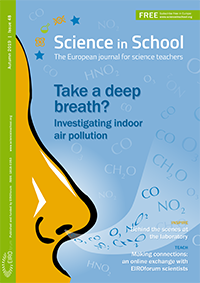Limoncello and the science of emulsions
How can you make oil and water stay mixed? A scientist’s curiosity about a lemon liqueur has revealed how to do this – with some promising industrial applications.

Showing 10 results from a total of 11
How can you make oil and water stay mixed? A scientist’s curiosity about a lemon liqueur has revealed how to do this – with some promising industrial applications.
New research is shedding light on the internal ‘clocks’ that help plants respond to changing day-night cycles.
Shorter days and cooler weather signal that it’s time to turn back the clocks, marking the end of daylight saving time. The darker evenings can knock our body clocks out of sync, taking a few days to readjust.
Witness a spectacular chemical reaction and take some careful measurements to work out the empirical formula of a compound.
New studies are uncovering how emissions from daily household activities pollute the air we breathe at home.
Science in School is published by EIROforum, a collaboration between eight of Europe’s largest intergovernmental scientific research organisations (EIROs). This article reviews some of the latest news from the EIROs.
Encourage students to stay safe in the sun with a collection of activities to discover the science behind sunscreen.
Connect your class with scientists across Europe in a video-conference exchange – and find out about life as a scientific researcher.
Applying high-tech science to the study of ancient art and famous paintings has been a rewarding career choice for synchrotron scientist Marine Cotte.
Limoncello and the science of emulsions
How plants beat jet lag
Editorial issue 48

Classic chemistry: finding the empirical formula
Take a deep breath? Investigating indoor air pollution
Magnetism in the Earth’s mantle, impressive asteroid observations, and insights into influenza
How effective is your sunscreen?
Making connections: an online exchange with EIROforum scientists
Art and science from Pompeii to Rembrandt